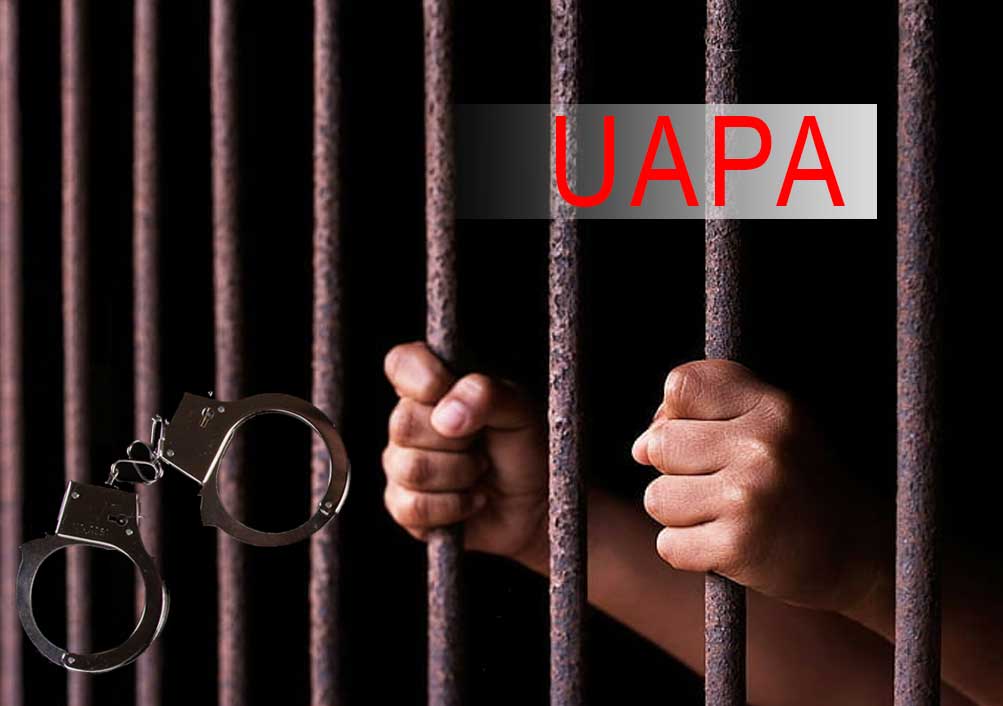In CRL.A. 115/2022- DEL HC- Mere smuggling of gold without any connection to threatening economic security or monetary stability of India not terrorist act, says Delhi HC while granting bail to 9 UAPA accused Justices Mukta Gupta & Mini Pushkarna [03-06-2022]

Tulip Kanth
New Delhi, June 4, 2022: Granting bail to nine accused-appellants charged under the Unlawful Activities (Prevention) Activities, 1967 for allegedly smuggling gold and furthering terrorist activities, the Delhi High Court has opined that mere smuggling of gold without any connection whatsoever to threatening economic security or monetary stability of India cannot be a terrorist act.
Referring to section 16 of UAPA which deals with the punishment for a “terrorist act”, the Division bench of Justice Mukta Gupta and Justice Mini Pushkarna considered the fact that in the present case as no death had been caused so, Clause b of Section 16 of UAPA was applicable which provides for sentence of minimum imprisonment for a period of 5 years which may extend to life imprisonment, thereby providing discretion to the Trial Court to pass a sentence of imprisonment from five years to life based on the facts of the case.
The allegation of the prosecution was that eight accused-appellants except appellant, Vaibhav Sampat More, were intercepted by the Delhi Zonal Unit of the Directorate of Revenue Intelligence, while travelling from Guwahati to Delhi and 504 gold bars which were being smuggled had been recovered from them at the New Delhi Railway Station. Thereafter, the accused were charged under Sections 16/18/20 of the UAPA and under Sections 120B/204/409/471 IPC for alleged commission of criminal conspiracy, furthering terrorist activities, threatening the economic security and damaging the monetary stability of India.
The case against the appellant, Vaibhav Sampat More, in the supplementary charge-sheet was that he was involved in collecting the gold consignment from the eighth accused and had facilitated in his travel for the same.The appeal in the present matter had been filed after the appellants’ plea for bail was declined.
Advocates Chirag Madan,Somesh Tiwari, Kartika Sharma and Kaveesh Nair appeared for accused Vaibhav Sampat More.
The arguments mainly revolved around the issue whether smuggling of gold can be covered under the ambit of “terrorist activity” as defined under Section 15(1)(a)(iiia). Referring to this section the Additional Solicitor General submitted that a larger conspiracy to commit a terrorist act was committed by the appellants by disturbing the economic stability of this country.
From the appellant’s side, the Counsels namely Chirag Madan, Saurabh Kripal, Mohit Mathur, Somesh Tiwari, Kartika Sharma, and Kaveesh Nair argued that if smuggling of gold was to be included as a terrorist activity while amending Section 15 of the UAPA, the Legislature in its wisdom would have also amended the Schedule to the UAPA to include the Customs Act. According to the counsels, this was indicative of the fact that it was never the Legislature’s intention to include the mere act of smuggling gold under the amended Section 15. It was also contended by the counsels that by mere smuggling gold into the country, it cannot be held that the same was with an intention to destabilize the country.
Justice Gupta, speaking for the Bench, opined that the word “gold” has not been added while amending Section 15(1)(a)(iiia) UAPA. Further possession, use, production, transfer of counterfeit currency or coin is per-se illegal and an offence, however, production, possession, use etc. of “gold” is not per-se illegal or an offence. Noting that even import of gold is not prohibited but restricted subject to prescribed quantity on payment of duty, the Bench affirmed, “Thus mere smuggling of gold without any connection whatsoever to threatening economic security or monetary stability of India cannot be a terrorist act.”
The Bench also considered the aspect that the main evidence with the prosecution to show that the gold bars recovered were smuggled gold, were the statements of the accused recorded under Section 108 of the Customs Act by the officers of the Customs. On this issue, The Bench referred to the judgment of the Top Court in K.I. Pavunny Vs. Assistant Collector (HQ), Central Excise Collectorate, Cochin wherein it was held that the statement recorded under Section 108 of the Customs Act will be admissible in evidence on the complaint laid by the Customs Officers for prosecution under Section 135 or other relevant Statutes. However, the Court noticed that the term “other relevant Statutes” will not include an unconnected Statute which does not even in its schedule include Customs Act as a scheduled offence.
Thus, considering the aforesaid aspects alongwith certain facts such as long period of custody already undergone, the duration of the trial and some of the appellants had filed petitions challenging the order granting sanction claiming that an alleged offence under the Customs Act cannot be brought in the realm of provisions of the UAPA, the Division Bench granted bail to the appellants and also imposed certain conditions.
Sign up for our weekly newsletter to stay up to date on our product, events featured blog, special offer and all of the exciting things that take place here at Legitquest.




Add a Comment